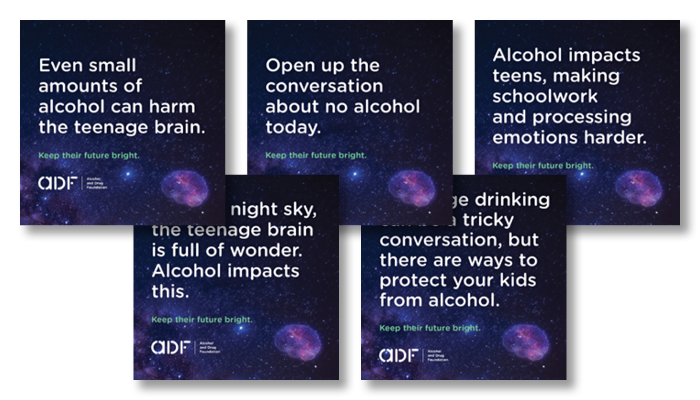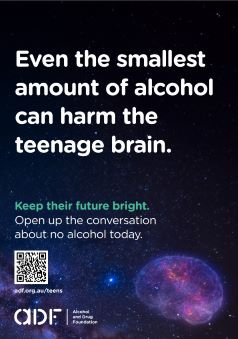Keep Their Future Bright campaign kit
We’ve put together this kit to provide you with easy resources that can be shared with your networks and communities - and reach the people that need it most.
Keep Their Future Bright is a campaign from the Alcohol and Drug Foundation, funded by the South Eastern NSW Primary Health Network.
Visit the campaign webpage at adf.org.au/teens for more information.
About the campaign
The Keep Their Future Bright campaign informs parents and carers about the harms of providing under 18s with even small amounts of alcohol, and encourages them to open up this conversation with their children.
The aim of this campaign is to influence parents’ behaviour so that they do not supply their children with even small amounts of alcohol.
- The campaign explores the impacts of alcohol on a teenager’s developing brain, mental health, social life and more.
- It helps parents rethink their attitudes towards supplying alcohol to their children and equips them to discuss the topic in their family.
- Our target audience is parents of children aged 12 to 17.
What’s included in this kit
- Social media templates with images and messages
- Downloadable poster
- Newsletter text with image and message
- Fact sheet to answer commonly-asked questions.
To support this campaign, we’re using our Talk About It guide for parents.
We developed this guide to help parents and carers talk to their children about alcohol and other drugs.
It explores how to have these conversations with young children through to teens, why young people might use alcohol and other drugs, and how to recognise when a young person may need help.
This campaign was developed following extensive national message research by Common Cause Australia, on behalf of the Alcohol and Drug Foundation.
Most people can think about any issue from multiple and often conflicting perspectives. This happens mostly subconsciously, which means people’s attitudes and behaviours are often driven by factors beyond their conscious awareness.
The purpose of this campaign is to tap into helpful perspectives in parents that change the way that they feel about the issue of supplying alcohol to their children. This can increase their chance of changing their behaviour in a positive way.
In this campaign, we do this by using values to persuade. We’re focusing on solutions, not problems and aiming to be on the parents’ level (not coming as ‘experts’ above them).
Our key messages
The research showed that certain messages were more convincing to parents than others.
We developed these key messages based on what parents found the most persuasive.
- As parents, we’re always learning and growing – especially when we come across new information about how to keep our kids healthy and safe.
- Research now shows us that exposing teenagers to alcohol, even in small amounts, is harmful to the cells inside the developing brain.1, 2 The effects can be anything from finding schoolwork harder to trouble processing emotions or performing at their chosen sport.
- As parents and carers, the guidance we give plays an important role in helping your kids enjoy their teenage years.3 Talking to children openly about alcohol’s harms, and refusing to supply it, will help keep them - and their developing brain - safe from harm.
- Everyone has a different approach to parenting, but most parents choose not to give alcohol to their underage children, knowing that even a small amount harms developing brains. They also don’t want their children growing up thinking alcohol is necessary to have fun, relax and socialise.
- We can teach our teenagers they can have fun, relax and enjoy time with others without alcohol - for example, by not offering them a drink with dinner, on camping trips or at weddings. When kids know they can socialise without alcohol, they can grow up to make healthier choices about drinking.
Campaign resources
Social media templates
Share the campaign on your social media channels in three easy steps:
- Download the ZIP file to save the campaign images to your device.
- Choose one of the social media messages, and copy and paste the text.
- Share on your social channel.
- Make sure to tag us by selecting @AlcoholDrugFdn in the post copy for Twitter, selecting Alcohol and Drug Foundation from the drop-down menu on Facebook, and @alcohol-and-drug-foundation on Linkedin.
In addition to sharing on your organisation’s social media channels, you could encourage staff to also share on their personal channels, to help spread the word.
Like us, follow us, link with us! Alcohol and Drug Foundation Facebook

Social media messages
- As parents, we’re always learning and growing – especially when we come across new info on keeping our kids healthy and safe. Research now shows us that exposing teenagers to alcohol, even in small amounts, is harmful to the developing brain. Find out more adf.org.au/teens
- Talking to teens openly about alcohol’s harms, and refusing to supply it, will help keep them - and their developing brain - safe from harm. For resources to help open up a conversation about no alcohol, visit the Alcohol and Drug Foundation website adf.org.au/teens
- As parents and carers, the guidance we give plays an important role in helping our children enjoy their teenage years. Talking openly about alcohol’s harms, and refusing to supply it, will help keep teens - and their developing brain - safe. Find out more adf.org.au/teens
- Research now shows us that exposing teenagers to alcohol, even in small amounts, is harmful to the developing brain. The effects can be anything from finding schoolwork harder to trouble processing emotions or performing at their chosen sport. Find out more adf.org.au/teens
YouTube video
You can also share the link to our hero YouTube video on social media or embed the video on your website.
A3 Poster
Download and print the A3 poster
Newsletter and website text
Keep their future bright – teenagers and alcohol
As parents, we’re always learning and growing – especially when we come across new information about how to keep our kids healthy and safe.
Research now shows us that exposing teenagers to alcohol, even in small amounts, is harmful to the cells inside the developing brain. The effects can be anything from finding schoolwork harder to trouble processing emotions or performing at their chosen sport.
As parents and carers, the guidance we give plays an important role in helping our kids enjoy their teenage years. Talking to your children openly about alcohol’s harms, and refusing to supply it, will help keep them - and their developing brain - safe from harm.
Use this fact sheet when talking to parents in your community.
These talking points appeal to parents’ positive values, and provide solutions without focussing on problems or repeating negative, fear-based messages.
- As parents, we can let our children know we’ll always be there for them, no matter what situation they find themselves in.
- We’re always learning and growing – especially when we come across new information about how to keep our kids healthy and safe.
- The alcohol industry uses sneaky social media marketing and product design to target teenagers. As parents and carers, we can help our kids resist alcohol marketing messages, and show them drinking isn’t necessary to have fun.
- Talking to your children openly about alcohol’s harms and refusing to supply it, will help them keep themselves and their friends safe.
- Everyone has a different approach to parenting, but most parents choose not to give alcohol to their underage children knowing that it harms developing brains even in small doses. They also don’t want their children growing up thinking alcohol is necessary to have fun, relax and socialise.
- By maintaining high expectations, setting a wise example, and keeping our relationship strong, it is more likely that our children will delay their alcohol experiences longer, and drink less when they do drink.
- Talk to them about the situations where they may be exposed to alcohol. Talk about what you do in a situation where you're feeling pressured. In doing that you’re helping build their skills and confidence to be able to say “no” if they are in that situation.
- The best thing we can do as parents is to delay our children from drinking until they are 18. Drinking alcohol is bad for a teenager’s developing brain, and starting to drink before 18 can lead to alcohol problems later on.
Contact
For more information or any additional templates to promote Keep Their Future Bright or information, please get in touch with Sophie Fredheim, Marketing Manager at sophie.fredheim@adf.org.au
Download a PDF version of the campaign kit here:
- Spear LP. Effects of adolescent alcohol consumption on the brain and behaviour.(Report). Nature Reviews Neuroscience [Internet]. 2018 [16.11.2022]; 19(4):[197(18) p.].
- Guerri C, Pascual Ma. Impact of neuroimmune activation induced by alcohol or drug abuse on adolescent brain development. International Journal of Developmental Neuroscience [Internet]. 2019 [17.10.2022]; 77(1):[89-98 pp.].
- Yap MBH, Cheong TWK, Zaravinos-Tsakos F, Lubman DI, Jorm AF.Modifiable parenting factors associated with adolescent alcohol misuse: a systematic review and meta-analysis of longitudinal studies. Addiction (Abingdon, England) [Internet]. 2017 [13.10.2022]; 112(7):[1142-62 pp.].
